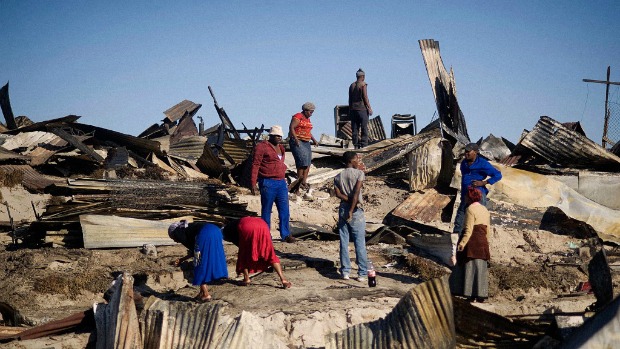April 15, 2015
Ten African innovators have been nominated for cash prizes because they came up with products that respond to a need or challenge within their communities.
Winners will be chosen in Morocco May 13 at the African Innovation Foundation’s annual Innovation Prize for Africa Awards, PCTech reports.
The awards are not only showcasing Africa’s ability to innovate to address its own challenges, but also celebrating Africa’s ingenuity, said McLean Sibanda, chairman of the Innovation Prize Africa 2015 selection panel.
African Innovation Foundation judges chose 10 nominees from 925 applications in 41 countries.
A $150,000 US cash prize will be shared by the three top winners — $100,000 for outstanding innovation and two prizes of $25,000 for innovation with the highest social impact and best business potential.
The innovations showcased at the awards are high-value African solutions with positive socio-economic impact, said Jean Claude Bastos de Morais, foundation founder.
Innovations range from e-health and education to agriculture. Check out the 10 nominees here and their African tech innovations that are solving problems
Water distillation system: Samuel O. Otukol, Uganda
This innovation proposes turning sea water to drinkable water. Salt water is evaporated at temperatures of 30-to-50 degrees Celsius (86-to-122 degrees Fahrenheit) and then condensed into fresh water cheaper than reverse osmosis. The proposed system can use solar energy. It claims to succeed where other desalination methods have failed.
Mellowcabs: Neil Du Preez, South Africa
Mellowcabs are a taxi service that fills the gap for commuters who need affordable, safe micro transport in a three-mile radius. This environmentally-friendly taxi service causes no pollution. The technology converts the energy typically lost in the braking process to electricity, recovering and storing it. Other innovations associated with Mellowcab include hydrogen-fueled vehicles and an app to book cab rides that can be paid for with cash or credit. The cabs also include mobile charging, location tracking and Wi-Fi access.
Cardio-pad: Marc Arthur Zang, Cameroon
For people living in rural areas with limited or no access to cardiologists, this innovation could be a solution for heart monitoring. Cardio-pad claims to be an affordable tablet that records and processes a patient’s heart signal before transferring it to a remote station using mobile phone networks. The device can be used in village hospitals and rural clinics where there is no cardiologist. Electrocardiography results can be downloaded on a tablet by the cardiologist. The results are interpreted using cardio-pad’s computer-assisted diagnostic embedded application. Results and prescription are transmitted to the nurse performing the procedure.
M-changa: Kyai Mullei, Kenya
Also known as E-harambee, this mobile app lets individuals and organizations start and manage fundraisers via text or web devices cheaply and efficiently. It combines money transfer technologies and mobile communication. M-changa allows users to fundraise, track contributions, and withdraw funds using mobile phones without having to rely on the Internet. This technology integrates unique aspects of African culture with technological innovation, bringing the benefits of mobile technology to all Africans, its makers say.
OSP, a new type of cement: Jean Bosco Kazirukanyo, Burundi
Hailed by its makers as a new type of cement, OSP protects water against carcinogenic oil spills. A new formulation of cement that can be sprinkled on fresh or old oil spills, the cement reacts with contaminants to form tiny lumps that can be “easily removed and deposited in designated plastic bins before being transported to concrete plants where they can be used as concrete additives,” PCTech reports. Oil spills are currently being disposed of in an unsustainable manner across Africa, causing huge ecological damage, its makers say. This innovation effectively contains and recycles harmful oil.
Alternative to livestock antibiotics: Adnane Remmal, Morocco
Adnane Remmal has patented an alternative to livestock antibiotics that has anti-bacterial, anti-parasitic and anti-fungal properties. It’s a natural formula that its maker claims reduces health hazards to cattle and humans, preventing transmission of many resistant germs and possible carcinogens through milk, meat and eggs to humans without costing farmers anything extra.
Lumkani fire detection: David Gluckman, South Africa
A device that prevents fires from tearing through informal settlements and densely populated communities, Lumkani claims to boost community mobilization efforts. Lumkani fire detection is an off-the-shelf fire detection device and alert service that uses radio frequency transmission technology. The device triggers an alarm to alert the family if there’s a fire. Within 20 seconds, a signal sets off heat detectors in a 60-meter radius that should elicit a community-wide response to the fire.
Seebox, an educational tool: Johann Pierre Kok, South Africa
This tool lets children learn principles of science and electronics by experimenting, measuring and building, addressing the shortage of science and electronics professionals. Children can enjoy a practical and experimental way of learning the sciences and electronics with short videos explaining what is being measured.
Farming profit sharing: Alex Mwaura Muriu, Kenya
This is a viable solution for small-scale African farmers who want to expand their businesses but lack collateral and credit history to borrow money from traditional institutions. The initiative identifies, screens and shortlists full-time farmers with smallholdings and helps them devise farming plans to attract potential investors who can profit. Investors and small scale farmers can both benefit. Farm Capital Africa is a well-developed risk-sharing agri-business funding model that draws in investors for a share of farming profits, according to PCTech.
Smartspot TBcheck: Lesley Erica Scott, South Africa
Tuberculosis is second only to HIV and AIDS as a cause of death in Africa. Smartspot’s flagship product, TBcheck assesses how accurate machines are that are used to detect TB and whether the machines are functioning properly. TBcheck claims to be different from other products on the market in that it’s easy and safe to use and can be delivered to labs safely and cheaply. Unlike other products, its makers say the product could help curb the TB epidemic in Africa.
Source: AFK Insider













